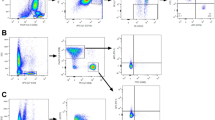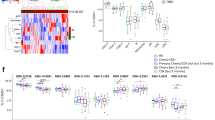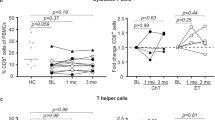Abstract
Immunosuppression has been often associated with the course of malignant diseases. In the present study, the proliferation of peripheral blood mononuclear cells (PBMCs) in response to mitogenic stimulation with phytohaemagglutinin (PHA) was assessed prospectively in 90 patients with stage I-III breast cancer. Whereas PHA-induced proliferation of PBMCs derived from patients with breast cancer preoperatively was significantly decreased when compared with data obtained in healthy control individuals (P < 0.001), the degree of the defect in PHA-induced proliferation of PBMCs depended upon the tumour burden as manifested by tumour size and axillary lymph node involvement (P < 0.003 in each case). PHA-induced proliferation of PBMCs dropped significantly in patients who received adjuvant chemotherapy consisting of cyclophosphamide, methotrexate and fluorouracil (CMF) after an observation period of 6 months (P < 0.01), but not in patients under adjuvant treatment with tamoxifen only. After an additional 6 months (i.e. 12 months after surgery), PHA-induced proliferation of PBMCs was similar in patients after adjuvant chemotherapy with CMF and in those receiving continued adjuvant tamoxifen treatment (P > 0.1), but in all patients still significantly decreased as compared with healthy controls (P < 0.001). When data obtained preoperatively and after 12 months were compared, it was found that out of 23 patients whose PBMCs had experienced a drop in their PHA-induced proliferation, 14 (61%) had developed metastatic disease within the subsequent 24 months (i.e. 36 months after surgery). In contrast, out of 59 patients whose PBMCs showed an increase in their PHA-induced proliferation within the first 12 months after surgery, only one (2%) presented with disease progression. We thus conclude that PHA-induced proliferation of PBMCs derived from patients with breast cancer depends upon the tumour load and is a good clinical predictor for the further course of the disease.
This is a preview of subscription content, access via your institution
Access options
Subscribe to this journal
Receive 24 print issues and online access
$259.00 per year
only $10.79 per issue
Buy this article
- Purchase on Springer Link
- Instant access to full article PDF
Prices may be subject to local taxes which are calculated during checkout
Similar content being viewed by others
Author information
Authors and Affiliations
Rights and permissions
About this article
Cite this article
Wiltschke, C., Krainer, M., Budinsky, A. et al. Reduced mitogenic stimulation of peripheral blood mononuclear cells as a prognostic parameter for the course of breast cancer: a prospective longitudinal study. Br J Cancer 71, 1292–1296 (1995). https://doi.org/10.1038/bjc.1995.250
Issue Date:
DOI: https://doi.org/10.1038/bjc.1995.250
This article is cited by
-
Simultaneous detection of circulating immunological parameters and tumor biomarkers in early stage breast cancer patients during adjuvant chemotherapy
Cellular Oncology (2016)
-
Effects of an exercise and hypocaloric healthy eating intervention on indices of psychological health status, hypothalamic-pituitary-adrenal axis regulation and immune function after early-stage breast cancer: a randomised controlled trial
Breast Cancer Research (2014)
-
Mindfulness based stress reduction study design of a longitudinal randomized controlled complementary intervention in women with breast cancer
BMC Complementary and Alternative Medicine (2013)
-
Immune, endocrine, and behavioral precursors to breast cancer recurrence: a case-control analysis
Cancer Immunology, Immunotherapy (2008)
-
Study protocol to investigate the effect of a lifestyle intervention on body weight, psychological health status and risk factors associated with disease recurrence in women recovering from breast cancer treatment [ISRCTN08045231]
BMC Cancer (2006)



